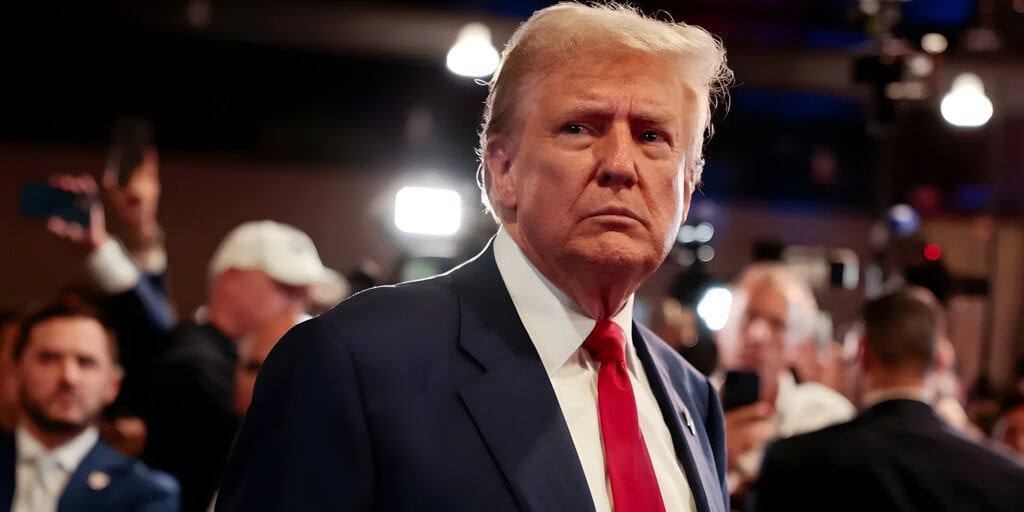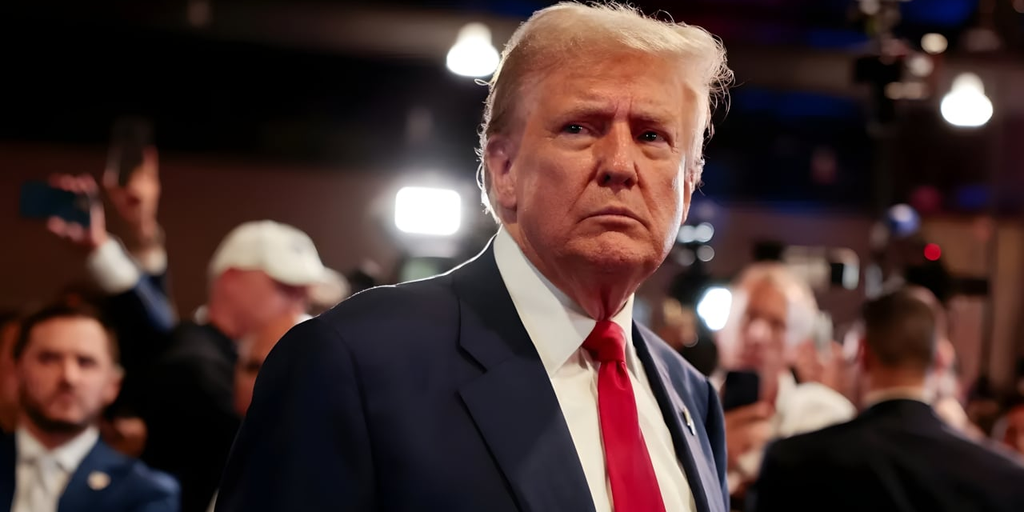Law and Order
Stablecoin Bills Unfairly Box Out Foreign Issuers Like Tether, Says House Majority Whip
Published
5 days agoon
By
admin

In a potential sign of brewing tensions regarding key language in multiple stablecoin bills circulating in Congress, House Majority Whip Tom Emmer (R-MN) said this week he doesn’t believe stablecoin issuers like Tether should have to comply with the anti-money laundering Bank Secrecy Act—a major sticking point of both the Senate’s stablecoin-focused GENIUS Act, and the House’s parallel STABLE Act.
Including such a provision in the legislation would unfairly box out foreign issuers, Emmer argues. The lawmaker believes stablecoin issuers, regardless of jurisdiction, should not be subject to the stringent anti-money laundering rules under the Bank Secrecy Act.
“The protections the so-called Bank Secrecy Act is supposed to provide were drafted for cash, and this is blockchain-driven,” Emmer told Decrypt Wednesday evening. “And guess what, everything on the blockchain is open and transparent to people who understand how to follow code.”
“It’s pretty interesting to say that the Bank Secrecy Act—which doesn’t even contemplate this type of technology, a digital asset—should be what we’re using,” the congressman added.
Stablecoins are digital assets typically pegged to the U.S. dollar and designed to keep a steady price. They’re used by cryptocurrency traders to enter and exit positions without the need for dollars, and used as dollar equivalents in markets where dollars are restricted or inaccessible.
The latest drafts of the GENIUS Act and STABLE Act treat all stablecoin issuers as financial institutions under the Bank Secrecy Act. The law, enacted in 1970, established a stringent set of proactive anti-money laundering rules that American banks must comply with in order to operate.
The Bank Secrecy Act, for example, obligates regulated institutions to engage in suspicious activity monitoring, undergo routine audits, hire compliance officers, and adopt a customer identification program mandated by the Patriot Act—the controversial law that expanded government surveillance powers shortly after the September 11, 2001, terrorist attacks.
Such requirements would pose quite a hurdle for existing foreign stablecoin issuers like Tether, the company behind USDT and the market’s undisputed leader. Tether, whose USDT stablecoin boasts a market capitalization in excess of $144 billion, is based in the U.S. Virgin Islands, and plans to move to El Salvador—but nonetheless is one of the world’s biggest purchasers of U.S. Treasuries, which it uses as collateral to back its U.S. dollar-pegged stablecoin.
In its current setup, Tether enjoys much less strict regulation than the Bank Secrecy Act would mandate, and the company’s leadership has implied that moves to force all stablecoin issuers to comply with such rules would hurt the firm and aid its competitors. By contrast, Circle, the issuer behind the market’s second-largest stablecoin USDC, is already based in the United States. While Circle does not yet comply with the Bank Secrecy Act, the company is regulated as a money transmitter by the New York Department of Financial Services.
Circle is also already in compliance with the European Union’s elaborate MiCA regulatory framework, a move Tether has resisted.
As stablecoin legislation in the U.S. nears a crescendo, questions have emerged regarding whether Tether would come to the United States if it had to comply with the Bank Secrecy Act—or, alternatively, what would happen if the stablecoin market’s top player was boxed out of American financial markets.
Emmer does not want to risk locking Tether, or any other foreign issuer, out of the burgeoning U.S. stablecoin sector.
“We’ve got to let everybody compete in this space,” he said.
That doesn’t mean Tether wouldn’t have to comply with certain rules in order to operate in the United States. To Emmer, the sticking point is proof of reserves—showing the government that your token is backed up with sufficient collateral to keep its value pegged to the dollar even in periods of market volatility.
To that end, Emmer believes Tether is, broadly speaking, doing well. In 2021, the company partnered with Wall Street firm Cantor Fitzgerald to help custody some of the $92 billion worth of U.S. Treasuries it claims to currently hold in reserve.
“Tether has done a great job straightening itself out in the last four years,” Emmer said.
The House Financial Services Committee is set to mark up the STABLE Act during a session next week. Meanwhile, the GENIUS Act already passed out of the Senate Banking Committee earlier this month with strong bipartisan support—Bank Secrecy language intact. It is likely to face a full vote on the Senate floor in the coming months.
Daily Debrief Newsletter
Start every day with the top news stories right now, plus original features, a podcast, videos and more.
Source link
You may like


Kraken Secures Restricted Dealer Status in Canada Amid 'Turning Point' for Crypto in the Country


Binance Sidelines Pi Network Again In Vote To List Initiative, Here’s All


XRP Price Reversal Toward $3.5 In The Works With Short And Long-Term Targets Revealed


Former New York governor advised OKX over $505M federal probe: Report


First Digital USD (FDUSD) Depegs After Justin Sun Alleges Firm Is ‘Insolvent’ and Not Fulfilling Redemptions


Gen Z’s Bitcoin Bet, The Largest Wealth Transfer In History?
Law and Order
Trump’s Crypto Conflicts Dominate Stablecoin Legislation Debate
Published
8 hours agoon
April 2, 2025By
admin

A House Financial Services Committee markup of stablecoin legislation appeared to go off course Wednesday, with Democrats spending hours hammering home the same message: Democrats would in principle support the STABLE Act, but see President Donald Trump’s personal involvement in the stablecoin sector as an unacceptable conflict of interest.
Multiple Democrats, including a co-sponsor of the STABLE Act itself, offered amendments to the bill on Wednesday that would have prevented the president, his cabinet, the first lady, and special government employees like Elon Musk from offering stablecoin products while in office.
One by one, over the course of hours, those amendments were shot down by voice vote the Committee’s slim Republican majority.
Republican leadership countered the proposals by arguing the STABLE Act currently requires all issuers to comply with the same rules, and that boxing out certain issuers—even the sitting president himself—would stifle market competition. The Act would create a set of rules, involving compliance with anti-money laundering laws and reserve audits, that all stablecoin issuers would have to comply with to operate in American markets.
“We’re not picking winners and losers here,” Committee Chair French Hill (R-AR) said. “If you don’t want to use a payment stablecoin, don’t use one.”
Numerous Democrats took issue with the position that the Trump family’s recently announced stablecoin, the World Liberty Financial USD1 token, should be treated like any other.
“He is unlike any other issuer because he’s the president of the United States,” Rep. Stephen Lynch (D-MA) retorted. “And he’s going to take U.S. taxpayer money to assist his family business when it gets in trouble.”
Stablecoins are digital assets pegged to the U.S. dollar that allow cryptocurrency traders to enter and exit positions without the need to access dollars directly. Some stablecoin issuers, like the Trump-backed World Liberty Financial, purport to strengthen U.S. dollar hegemony by encouraging the use of dollar-backed assets in both foreign and digital asset markets. But absent a regulatory framework in the United States, the legality of such products remains in question.
The Trump family’s lucrative crypto investments have caused some controversy ever since the president returned to the White House, where he is currently overseeing the creation of the nation’s first ever digital assets regulatory framework. But the Trump family’s announcement last week of a stablecoin product—right at the moment that stablecoin legislation is moving quickly through both chambers of Congress—appears to have struck a particularly resonant chord with Democrats.
The timing appears to have been inadvertent. A source with direct knowledge of the matter told Decrypt that World Liberty did not intend to roll out its stablecoin so soon. The revelation of blockchain data concerning the product, though, appears to have forced the team’s hand.
It remains unclear whether the flare up over Trump’s crypto dealings will meaningfully change the calculus when it comes to bipartisan support for the STABLE Act, which has until now been widely expected to earn a fair number of Democrat votes. One House Financial Services Committee staffer told Decrypt Wednesday they do not anticipate much has changed after today’s mark up, in terms of Democrat support for the bill.
And yet on Monday, Rep. Hill, the Committee’s Republican chair, took the rare step of conceding that Trump’s crypto dealings—particularly, the president’s stablecoin and meme coin projects—have made the task of creating legislation in the same areas “more complicated.”
Some Democrats already cosponsoring the STABLE Act, including Rep. Sam Liccardo (D-CA), issued forceful rebukes of Trump’s crypto dealings on Wednesday. Liccardo said the need to prevent high-ranking officials like Trump from offering their own stablecoins was “self-evident and obvious,” and highlighted the potential for such tokens to offer foreign actors a means to curry favor with the president.
Another House staffer familiar with the work of the House Financial Services Committee told Decrypt, however, that Democrats who already cosponsored the bill embraced it last month as it was written then—and are unlikely to change their positions over tweaks that, while important, may not be existential.
“You can connect the dots on what will happen if those amendments don’t get in,” the staffer said.
Daily Debrief Newsletter
Start every day with the top news stories right now, plus original features, a podcast, videos and more.
Source link
Law and Order
Crypto-Backed Candidates Patronis and Fine Win Key Florida Seats
Published
24 hours agoon
April 2, 2025By
admin

Republican candidates Jimmy Patronis and Randy Fine secured victories in Florida’s special congressional elections Tuesday night, extending the GOP’s narrow House majority with significant backing from crypto industry super PACs.
Fine captured 56.7% of the vote in Florida’s 6th District against Democrat Josh Weil, while Patronis won Florida’s 1st District with 57% against Gay Valimont.
Both campaigns received substantial support from Defend American Jobs, a Republican-focused crypto PAC operating within the broader Fairshake political funding network.
Those wins represent yet another victory for crypto industry interests.
Patronis and Fine “have shown a deep commitment to advancing pro-growth policies and ensuring the U.S. leads the world in crypto and digital asset innovation,” Defend American Jobs said in an emailed statement to Decrypt after the results.
“Their election is a win for jobs, innovation, and American leadership.”
While Fine’s 14-point win margin shows a significant contraction from President Trump’s 30-point advantage in the same district last November, it’s worth mentioning that Weil had a $10 million war chest compared to Fine’s roughly $1 million.
In January, Fairshake raised over $116 million, which has been directed toward spending for the 2026 midterms, Decrypt reported.
Fairshake is affiliated with Defend American Jobs and Protect Congress. By the time the 2024 elections began, the network had invested some $133 million toward its cause.
Those efforts have helped secure GOP seats across the board in recent months and are intended to win favorable regulatory support in the years ahead.
With crypto legislation on stablecoins and market structure pending in Congress, the two new electoral wins could help solidify the slim Republican majority needed to advance pro-crypto bills.
Leading firms and leaders in the space—including exchange operator Coinbase, blockchain payments company Ripple, tech investor Andreessen Horowitz, and Gemini co-founders Cameron and Tyler Winklevoss—have all donated to Fairshake’s efforts.
Edited by Sebastian Sinclair
Daily Debrief Newsletter
Start every day with the top news stories right now, plus original features, a podcast, videos and more.
Source link
Law and Order
Kristin Smith Steps Down as Blockchain Association CEO to Lead Solana’s Policy Push
Published
1 day agoon
April 1, 2025By
admin

Blockchain Association CEO Kristin Smith will resign next month from her role at the prominent crypto-focused industry group that helped elect the U.S.’ first pro-crypto president to lead Layer-1 blockchain Solana’s new policy push.
Smith will begin a new role as president of Solana’s Policy Institute on May 19, she said Tuesday in an X post. Her last day at the Blockchain Association will be May 16.
The Blockchain Association’s Board of Directors has already begun the search for Smith’s successor, the group’s communications lead Curtis Kincaid told Decrypt.
“We’ve grown from a small group of passionate advocates into a leading force in Washington, D.C., and beyond,” Smith said in the X post. “Blockchain Association today is stronger than ever.”
Founded in 2018, the Blockchain Association is one of several industry groups that has fought to advance the crypto industry’s interests on Capitol Hill. Their efforts helped lead to the election of pro-crypto President Donald Trump last November—a watershed moment for an industry that had previously existed on tenterhooks.
But as digital asset firms’ clout in Washington D.C. has grown, so too have calls to enshrine even more of the industry’s interests into law. To meet that demand, a few Layer-1 blockchains have launched policy institutes. Now, Solana is joining them.
Edited by James Rubin
Daily Debrief Newsletter
Start every day with the top news stories right now, plus original features, a podcast, videos and more.
Source link

Kraken Secures Restricted Dealer Status in Canada Amid 'Turning Point' for Crypto in the Country

Binance Sidelines Pi Network Again In Vote To List Initiative, Here’s All

XRP Price Reversal Toward $3.5 In The Works With Short And Long-Term Targets Revealed

Former New York governor advised OKX over $505M federal probe: Report

First Digital USD (FDUSD) Depegs After Justin Sun Alleges Firm Is ‘Insolvent’ and Not Fulfilling Redemptions

Gen Z’s Bitcoin Bet, The Largest Wealth Transfer In History?

Trump’s Crypto Conflicts Dominate Stablecoin Legislation Debate

First Digital denies allegations, threatens legal action

Crypto Firm Galaxy Secures UK FCA Approval for License to Expand Derivatives Trading

Why Is The Bitcoin Price Surging Today?

Cardano Founder Reveals What Will Onboard 3 Billion New Users Into Crypto

Sentient open-source AI search outperforms GPT-4o and Perplexity

Memecoin Collapse Creates Perfect Moment for TradFi To Launch ‘Trusted Assets,’ According to Chris Burniske

Breez Announces Launch Of New Wallet, Misty Breez

Alabama, Minnesota Advance Bitcoin Reserve Plans With Companion Bills

Arthur Hayes, Murad’s Prediction For Meme Coins, AI & DeFi Coins For 2025

Expert Sees Bitcoin Dipping To $50K While Bullish Signs Persist

Aptos Leverages Chainlink To Enhance Scalability and Data Access

Bitcoin Could Rally to $80,000 on the Eve of US Elections

Sonic Now ‘Golden Standard’ of Layer-2s After Scaling Transactions to 16,000+ per Second, Says Andre Cronje

Crypto’s Big Trump Gamble Is Risky

Institutional Investors Go All In on Crypto as 57% Plan to Boost Allocations as Bull Run Heats Up, Sygnum Survey Reveals

Ripple-SEC Case Ends, But These 3 Rivals Could Jump 500x

Has The Bitcoin Price Already Peaked?

A16z-backed Espresso announces mainnet launch of core product

Xmas Altcoin Rally Insights by BNM Agent I

Blockchain groups challenge new broker reporting rule

The Future of Bitcoin: Scaling, Institutional Adoption, and Strategic Reserves with Rich Rines

Trump’s Coin Is About As Revolutionary As OneCoin

Is $200,000 a Realistic Bitcoin Price Target for This Cycle?
Trending

 24/7 Cryptocurrency News5 months ago
24/7 Cryptocurrency News5 months agoArthur Hayes, Murad’s Prediction For Meme Coins, AI & DeFi Coins For 2025

 Bitcoin3 months ago
Bitcoin3 months agoExpert Sees Bitcoin Dipping To $50K While Bullish Signs Persist

 24/7 Cryptocurrency News3 months ago
24/7 Cryptocurrency News3 months agoAptos Leverages Chainlink To Enhance Scalability and Data Access

 Bitcoin5 months ago
Bitcoin5 months agoBitcoin Could Rally to $80,000 on the Eve of US Elections

 Altcoins2 months ago
Altcoins2 months agoSonic Now ‘Golden Standard’ of Layer-2s After Scaling Transactions to 16,000+ per Second, Says Andre Cronje

 Opinion5 months ago
Opinion5 months agoCrypto’s Big Trump Gamble Is Risky

 Bitcoin5 months ago
Bitcoin5 months agoInstitutional Investors Go All In on Crypto as 57% Plan to Boost Allocations as Bull Run Heats Up, Sygnum Survey Reveals

 Price analysis5 months ago
Price analysis5 months agoRipple-SEC Case Ends, But These 3 Rivals Could Jump 500x


